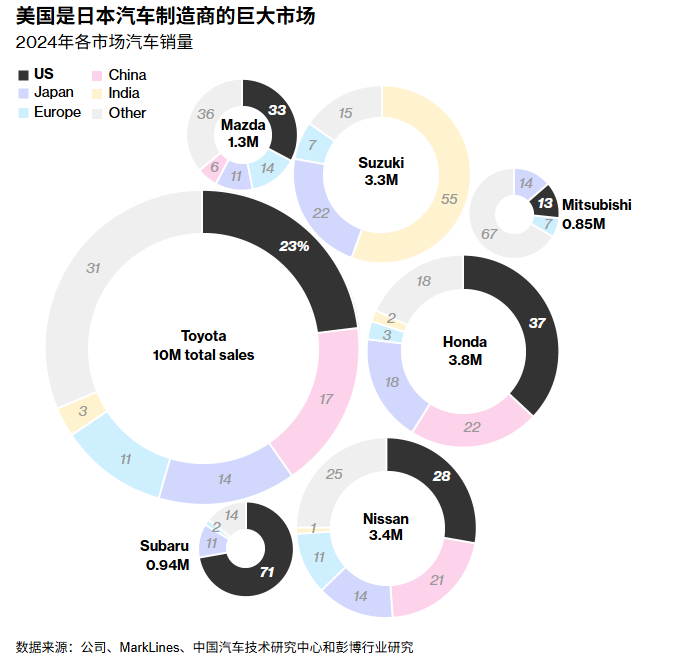US President Donald Trump said that the auto trade between the United States and Japan was unfair and proposed maintaining a 25% auto tariff. If no agreement could be reached, the US would raise auto tariffs across the board in a little over a week.
“So we don’t give them our cars. They won’t accept our cars, right? But we bring in millions of their cars to the United States. That’s not fair,” Trump said in a Fox News interview that aired on Sunday.
“Now we have oil. They can take a lot of oil. They can also take a lot of other things,” he said when talking about the ways Japan might reduce the US trade deficit.

These remarks indicate that there is still a considerable distance for the two sides to reach an agreement and highlight the risk that Trump may insist on imposing a 25% tariff on automobiles.
This interview was conducted after a new round of talks between Tokyo’s chief trade negotiator, Ryohei Akazawa, and Commerce Secretary Howard Lutnick. Akazawa flew across the globe to Washington for face-to-face talks. Although the two sides initially held face-to-face talks, the subsequent two meetings were conducted over the phone.
On Monday morning, auto-related stocks on the Tokyo Stock Exchange fell by 0.5%, while the overall index rose by 1% during the same period.
Tariffs on the automotive industry have become a key sticking point in the negotiations. Washington is concerned about the huge trade deficit in the automotive sector, while Tokyo is trying to protect a key pillar of its economy.
Ichiro Akazawa has repeatedly stated that the 25% tariff imposed by the United States on Japanese automobiles is unacceptable. The Japanese automotive industry has made significant contributions to the US economy, investing over 60 billion US dollars and creating 2.3 million jobs.
The Japanese official in charge of customs duties arrived in Washington late last week to attend the seventh round of negotiations and extended his stay, hoping to reach an agreement before the July 9 deadline for raising “reciprocal” tariffs approaches. Japan has been insisting on keeping industry tariffs on automobiles and other goods in the broader “reciprocal” tariff negotiations.
Akizawa said that he would keep the deadline in mind but not be obsessed with it, because Tokyo’s goal is to resolve all trade disputes through a package deal, which also includes addressing industry tariff issues.
The Japanese government’s statement released over the weekend said that Akazawa and Luetikke had a “fruitful” discussion and agreed to continue seeking an agreement that is beneficial to both the United States and Japan. The statement covered one face-to-face meeting and two phone calls between Akazawa and Luetikke during Akazawa’s visit to Washington, but did not mention the content of the discussions or whether any progress was made.
The United States has imposed a 25% tariff on automobiles and auto parts, and a 50% tariff on steel and aluminum. If no agreement is reached in time, the current 10% comprehensive tariff will jump to 24%. If negotiations fail to make a breakthrough, Japan’s economy, which shrank in the first quarter, may fall into a technical recession.
Trump’s remarks in the interview did not make anyone feel that Japan was any closer to reaching an agreement or winning an extension of the reciprocal tariff exemption. On the contrary, Trump hinted that the United States could unilaterally set the terms of trade with Japan.
“I will send a letter,” Trump said in the interview, referring to a plan to inform some trading partners that the US will unilaterally impose tariffs. “I can send a letter to Japan. ‘Dear Mr. Japan, here’s the situation. Your cars will face a 25% tariff.'” ’”


